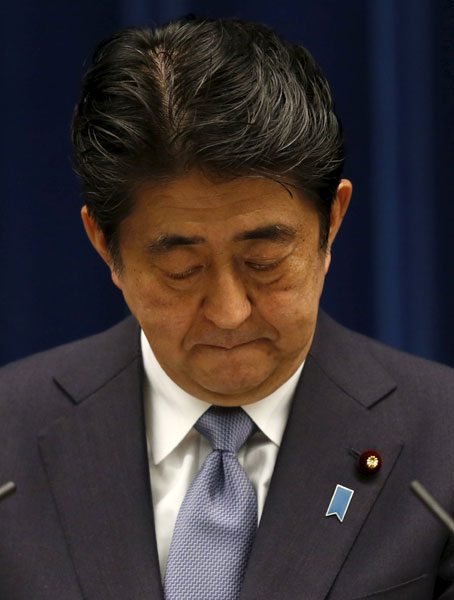Abe shies away from direct apology
By CAI HONG/ZHANG YUNBI/ZHAO YANRONG (China Daily) Updated: 2015-08-15 07:33
China is urging Japan to repent in concrete terms after Japanese Prime Minister Shinzo Abe attempted to downplay his country's aggression in a long-awaited statement marking the end of World War II.
In a statement released one day ahead of Saturday's 70th anniversary of the end of the war, Abe did mention the awaited key words-"aggression", "apology", "colonial rule" and "deep remorse".
But he mentioned them quoting or summarizing, without directly stating his own ideas.
"Japan has repeatedly expressed the feelings of deep remorse and heartfelt apology for its actions during the war," Abe said. "Such positions articulated by the previous Cabinets will remain unshakable into the future."
In some parts of the speech, he tried to retell history without stating the nature of the war was aggressive, analysts noted.
"In countries that fought against Japan, countless lives were lost among young people with promising futures. In China, Southeast Asia, the Pacific islands and elsewhere that became the battlefields, numerous innocent citizens suffered and fell victim to battles," Abe said.
Seoul-based Yonhap News Agency said that Abe "did not offer his own apology clearly, although he expressed 'profound grief' over war dead".
Ruan Zongze, vice-president of the China Institute of International Studies, said that Abe seemed to talk insincerely when mentioning the key words, and "the new position came from pressure, both domestically and internationally".
"If Abe continues pushing his radical right-leaning agenda, he will contradict his previous pledges further frustrate the international community," Ruan said of the radical security bills discussed in Japan's upper house.
- Abe's watered-down apology fails sincerity test
- Japan's Abe offers no fresh apology for past aggression, colonial rule
- Abe should apologize for Japan's wartime crimes in WWII speech
- Abe's stance on past to decide Japan's future
- Abe statement to be touchstone for S. Korea-Japan ties: S. Korean FM
- Crafty rhetoric, insincere politics





